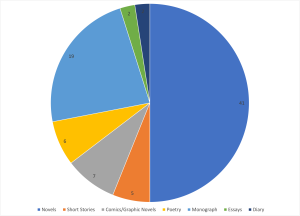#agir Recommendations for March 6, 2015
Song: “Shedding Skin” by Ghostpoet
I somehow missed entirely the fact that Ghostpoet had a new record coming out (though, of course, it isn’t out in the U.S., because it’s 1950, apparently). To my mind, he’s one of the more interesting voices in, very broadly, hip-hop right now, and certainly a singular one— nobody else sounds like this. While others, especially in the U.K., have incorporated elements of electronic and dance music, nobody else I know of is pulling from quite the same sources. He’s also unusual in his subject matter; his songs are, mostly, about everyday life, often the most mundane parts of it, and the feeling of being too caught up in the effort of getting out the door to work every morning to think about much else; one of his early singles talked about “mixing up bowls of Wheetabix” for the kids in the morning. Anyway, he’s become one of those artists that I can remain interested in and supportive of even if I don’t love everything he does (and I did find his last album a little disappointing). But I do like this track a lot.
Article: “What Netflix Tells Us about Decision Paralysis” by Rick Paulas
I was drawn to this by the first paragraph:
This is how it goes: You crumple into the couch after the hard grind of a workday. You drive your hand into the cushions, retrieve the remote, and automatically bring up the Netflix menu. You scroll through, first Comedies, then Critically-Acclaimed Dramas, then British TV because everyone’s talking about this Black Mirror thing. You select one, read the synopsis, and by then, it’s lost your interest, and you move on. You look at the clock, do some calculations, realize the run-time of whatever you’re about to play is greater than the amount of time remaining before you’re set to go to bed. You turn off the TV, get up from the couch, and curse yourself for wasting the opportunity.
Yeah, I know that feeling.
There’s also an interesting debate described here, though, between the psychological perspective that says we are overwhelmed, and therefore much less satisfied, when given too many choices, and an economic perspective that says that stores and merchants and services like Netflix seem to make more money when they have more options on offer, which suggests that we must want those additional choices. Paulas makes some effort to reconcile these two perspectives here by talking about how technology has altered the equation, and the difference between an expenditure of time and one of money. To me, though, it seems like there’s no real incompatibility there at all, and the problem is just the use of consumer purchasing decisions as a proxy measure of satisfaction. What I mean is, when we are paying to shop somewhere or to use a service like Netflix, we think we prefer more options, but when it comes to the actual act of making a choice those options are overwhelming. Our decision to keep paying more to have more options doesn’t reflect this experience.
Article: “Are You Man Enough for the Men’s Rights Movement?” by Jeff Sharlet
Spoiler alert: no, I’m not.
I’m not recommending this because I agree with the people Sharlet is talking to, in any way. I’m recommending it because I haven’t been able to stop thinking about this piece since I read it a few days ago. The men’s rights movement says, I think, a lot about the dynamics of power and cultural change. What characterizes these guys more than anything is a powerful feeling of thwarted entitlement. They feel, in other words, that they are bing denied something that they deserve, simply for being men, and that leads them to see feminism and growing gender equality not as a loss of privilege but a loss of rights. They experience the loss of a dominant social and cultural position not as an equalization, but as a straightforward reversal of that dominance. It’s reflective of a worldview in which some people will always have power over others, and the only question is which group you are in.
I feel a little bit of an obligation to be more even-handed than I think Sharlet’s piece is, so I’ll also point to this one, which does make it clear that there are some legitimate concerns in evidence among men’s rights activists— custody issues and men as victims of domestic violence, in particular. But the problem with the “movement” is shown clearly in the chart the author made of the most frequent topics of discussion on Reddit’s Men’s Rights boards, where those more legitimate concerns are mixed up with stuff like the prevalence of false rape accusations and circumcision as a form of “male genital mutilation.”
Article: “Phantom of the Orchestra” by Christopher Beam
Mamoru Samuragochi became a famous composer in Japan because of his remarkable story as much as his music; like Beethoven, he’d gone completely deaf— possibly because his parents had been in Hiroshima when the bombs dropped— but continued to put the music in his head on paper. This included a symphony and a piece written for the victims of the Fukushima nuclear disaster— after Hiroshima and Nagasaki, Japan’s next great national trauma. But…it turns out he was neither really deaf nor really writing much if any of the music. I wish the article was able to give us more of a sense of how, exactly, a person decides to do something like Samuragochi did, but it seems he doesn’t quite admit to being a total fraud, and his denial blocks our understanding as much as, possibly, his own. But it’s a fascinating story anyway.
Download the articles from this week as a readlist here.


